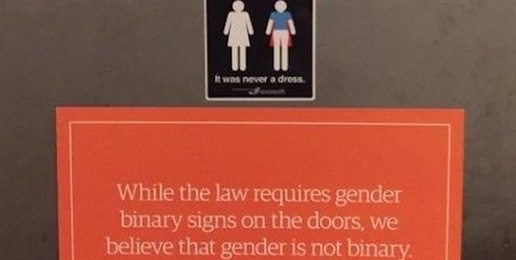
District 200
It’s not just District 211, the largest high school district in Illinois, that’s allowing gender-dysphoric students to use opposite-sex facilities. Rumors are circulating that gender-dysphoric students, enabled by their deceived parents, are asking school districts all over Illinois for permission to use opposite-sex restrooms and locker rooms. School administrations are accommodating these requests (or demands) in diverse ways and doing so without community input, without parental notification, and without establishing policy. One of those districts is District 200, a K-12 district in DuPage County that serves Wheaton, Warrenville, and portions of Carol Stream, West Chicago, and Winfield, which has multiple gender-dysphoric students, at least one of whom—an actual girl—is allowed to use a curtained changing area in the boys’ locker room. This information has been withheld from the public.
Dr. Robert Rammer, assistant superintendent for administrative services, likens restroom and locker room accommodations for gender-dysphoric students to accommodations made for students who have reading problems. He posits the ludicrous claim that if school districts do not share accommodations made for students with reading problems with parents of District 200 students, then there is no reason to share restroom and locker rooms accommodations for gender-dysphoric students with district parents. His comparison works only if no other student is affected in any way by the accommodations made for gender-dysphoric students. But all students are affected by such a practice because it embodies and teaches a number of assumptions about the nature of the relationship between physical embodiment and “gender,” and about how society ought to respond to gender-dsyphoria.
Rammer also stated that the district has no policy regarding gender-dysphoric students. The district’s response depends on the particulars of each case. So, what happens if or when a gender-dysphoric student and his parents demand, as the ACLU demanded for the boy in District 211, that he be permitted unfettered access to the girls’ restrooms and locker room? What will District 200 do, and are there any accommodations of which they think other parents are entitled to be apprised?
Rammer, like many administrators, believes that the presence of stalls in restrooms provides sufficient privacy to justify allowing gender-dysphoric students in opposite-sex restrooms. When asked, “If stalls provide sufficient privacy to justify allowing gender-dysphoric students in opposite sex restrooms, why not make all restrooms co-ed,” Rammer admitted he has no answer. He did, however, acknowledge that the presence of urinals in boys’ restrooms creates a problem that is not present in girls’ restrooms. I guess there remains a line—now measured in micrometers—over which administrators are not quite ready to cross.
Rammer’s acknowledgement about urinal’s constitutes a tacit admission that the District 200 gender-dysphoric girl is not in reality a boy and that physical embodiment (i.e., maleness and femaleness) matters.
Another issue that will eventually arise is the problem of district-wide mandated lying. As all educators know, or should know, pronouns denote and correspond to objective biological sex—not to desires about one’s sex. Therefore, using opposite-sex pronouns to refer to or discuss gender-dysphoric students constitutes not merely a misuse of grammar but lying. When asked if the district requires staff and faculty to use opposite-sex pronouns when referring to gender-dysphoric students, Rammer responded with a definitive “Yes.”
When asked if the administration would make accommodations for faculty members who have either religious objections or non-religious moral objections to lying, he said, “Why would any conscientious teacher want to harm students?” Wow. No discussion of what constitutes harm, no attempt at an argument. Rammer simply assumes that using correct pronouns constitutes harm.
Others, however, believe that facilitating a delusion or unhealthy, disordered desire constitutes harm. And many believe that government employees have no ethical, legal, or constitutional right to require subordinates to lie.
Rammer then posited another absurd comparison, suggesting that a refusal to call a student named “Robert” by the nickname “Bob” is analogous to refusing to refer to a girl as “he.” He believes it’s a sound analogy because in both cases, a student would “feel bad.” This illustrates the feckless thinking that permeates public schools. Many administrators and teachers falsely believe that the subjective feelings of students determine what constitutes harm or benefit. This is, indeed, the fallacious foundation of the toxic environment on college campuses. “Progressive” thinking holds that the subjective feelings of hearers determine the ethical legitimacy of speech—well, the subjective feelings of those groups certified “oppressed” by “progressives.”
Rammer further shared that no teacher has complained about the requirement to participate in a fiction (i.e., to lie). And as everyone knows, since public schools are bastions of free speech, diversity, and “safe spaces” for all, conservative teachers always speak truth to administrators. This is also the near-universal rhetorical ploy of school administrators to silence critics: “Well, by golly, yours is the first complaint I’ve heard.”
Sooner or later a Christian teacher will muster the courage to live with integrity no matter the cost. They will do what theologian John Piper has said Christians should do:
[I]f in the office where we worked, I was compelled to identify every so-called transgendered person by the pronoun they preferred in all of my emails, or conversations…or I would get disciplined…, at that point I would say to my superiors, I cannot treat he’s as she’s and she’s as he’s….I would be lying to call a he a “she.” I am not lying to call a male “Sally.” That is a culturally arbitrary weird fluke. But I am lying if I say about a true Jim who wants to be called Sally, “she.” And it would be contrary to my understanding of sexuality and I would start looking for another job.
Questions for school administrators
Below are questions that every taxpayer should ask their local school administrators, including the administrators of elementary and middle schools, and then they should hightail it to the next school board meeting to request that policy be written mandating that restrooms and locker rooms correspond to objective biological sex. The specificity of the questions is necessary in order to ensure that accurate information is obtained, to make explicit the assumptions embedded in Leftist restroom/locker room practices, and to prevent administrators from obfuscating:
1.) What are your policies and practices with regard to restroom and locker room-usage by gender-dysphoric students?
2.) Do you allow gender-dysphoric students to use multiple-stall, opposite-sex restrooms?
3.) Do you allow gender-dysphoric students to use opposite-sex locker rooms?
4.) If gender-dysphoric students are permitted to use locker rooms, do they have to walk through any area where opposite-sex students may be changing or showering?
5.) If you allow, for example, an objectively male, gender-dysphoric student to use the girls’ restrooms and locker room, on what basis would you prohibit objectively male, non-gender-dysphoric students from using them? If school policy prohibits discrimination based on “gender identity,” wouldn’t the district be violating policy by prohibiting non-gender-dysphoric students from using opposite-sex restrooms?
6.) If gender-dysphoric students shouldn’t have to use restrooms and locker rooms with those whose “gender identity” they don’t share, why should other students be forced to use facilities with those whose sex they don’t share?
7.) If restroom stalls and privacy changing areas are sufficient to force students to use facilities with those whose sex they don’t share, then why aren’t restroom stalls and privacy changing areas sufficient to force a gender-dysphoric student to use facilities with those whose “gender identity” they don’t share?
8.) If restroom stalls and privacy changing areas are sufficient to allow a male student in the girls’ facilities, then why aren’t stalls and privacy changing stations sufficient to allow all male students in the girls’ facilities?
9.) If restroom stalls are sufficient to allow a male student in the restroom, would you also allow all male staff and faculty in the women’s staff and faculty restrooms that are equipped with multiple stalls?
10.) Do you agree that many, perhaps most girls and women prefer not to urinate and defecate in a stall next to an unrelated male doing likewise? Do you find something unnatural or pathological about those feelings? Do you think such feelings deserve to be respected and honored through policy and practice?
11.) Do you think it’s possible that policies and practices that allow gender-dysphoric students to use opposite-sex restrooms and locker rooms may be communicating to other boys and girls that their discomfort with sharing facilities with opposite-sex students are wrong, ignorant, bigoted, or lacking in compassion?
12.) Why should girls care whether the boy in the restroom likes his body or not?
13.) If you allow gender-dysphoric students to use opposite-sex restrooms and/or locker rooms, do you notify all parents and guardians that their sons or daughters may be using facilities with opposite-sex students?
14.) How long have you allowed gender-dysphoric students to use opposite-sex restrooms and locker rooms?
15.) Do you require staff, faculty, and administrators to use opposite-sex pronouns when talking to or about gender-dysphoric students?
16.) Since pronouns denote and correspond to objective biological sex—not feelings about one’s sex—what if a staff member, teacher, or administrator views using opposite-sex pronouns for gender-dysphoric students as lying, and for moral and/or religious reasons object to lying or deception. Will you accommodate their objections to lying or deception?
17.) Many “trans-activists” argue that “gender identity” is not fixed. What will the school do when faced with a student whose gender identity is “bi-gender” or “genderfluid” and he/she demands to use whichever facilities correspond to his/her gender on any particular day or year?
18.) Liberal sex and gender researchers J. Michael Bailey at Northwestern and Dr. Eric Vilain at UCLA write that 80% of males—who constitute the majority of gender dysphorics—will accept their real sex by adulthood. They claim that “it looks like parental acquiescence leads to persistence.” In other words, if parents accommodate their children’s efforts to pretend to be the opposite sex, their children are more likely to persist in their rejection of their sex. Do you have concerns that by allowing gender-dysphoric students to use opposite-sex facilities, you may be increasing the likelihood that they will persist in their rejection of their sex?
Title IX specifically states that schools have the legal right to maintain separate restrooms, locker rooms, and showers for girls and boys. Further, case law confirms that right. Yet, school administrations are kowtowing to the Left. Evidence for that can be found both in school policies, school practices, and in the language administrators use. When parents and other community members talk to their local administrators, they should pay close attention to their rhetoric. If I were a betting woman, I would bet all my money that school administrators will use Leftist language, including “transgender” and opposite-sex pronouns for gender-dysphoric students.
Take ACTION: Please email or call your local school administrators pronto. Let’s not be Johnny come-latelies to yet another culture battle. There is too much at stake for children—including gender-dysphoric children who are being harmed by schools that embrace the pernicious sexuality ideology of the Left.
Support IFI
Please consider supporting IFI’s ongoing work to educate, motivate and activate Illinois’ Christian community. Your donation will help us stand strong in 2016! To make a credit card donation over the phone, please call the IFI office at (708) 781-9328. You can also send a gift to:
Illinois Family Institute
P.O. Box 88848
Carol Stream, Illinois 60188

























